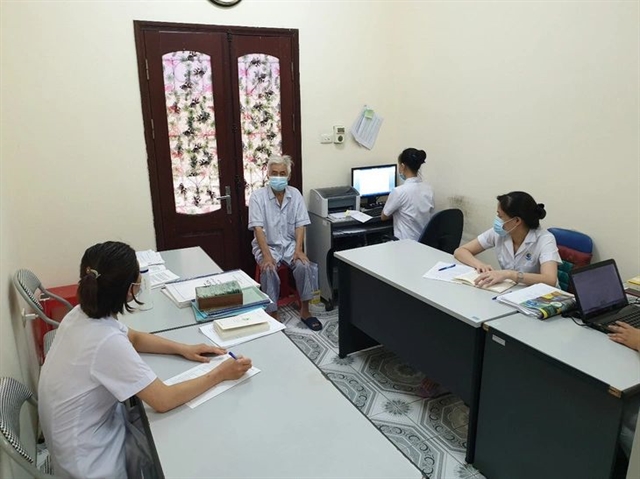 Society
Society

 |
| Medical workers give consultancy for a patient with a mental disorder at the Hà Nội Mental Hospital. — Photo tuoitre.vn |
HÀ NỘI — About 14 million people suffer from mental disorders in Việt Nam, but the country has only 143 clinical psychologists and psychotherapists, the Sức khỏe & đời sống (Health & Life) newspaper reported.
Moreover, clinical psychology services are not officially covered by health insurance.
This was the message delivered at a conference on strengthening the capacity of the mental healthcare system in the period of 2023-30, which was organised last Thursday by the Department of Medical Service Administration (DMSA).
Cao Hưng Thái, deputy director of the DMSA, said that Việt Nam was facing a double-edge problem related to diseases.
Việt Nam is feeling impacts due to a gradually ageing population and a high proportion of people with neural disabilities, as well as the consequences of the COVID-19 pandemic.
But compared to other industries, mental health receives less attention.
A survey last year by DMSA showed that 61.3 per cent, or 398 out of 649, of district hospitals organised outpatient medical examinations and treatment for mentally ill patients.
However, only 9.1 per cent, equivalent to 59 out of 649, of district-level hospitals organised inpatient medical examinations and treatments for mentally ill patients.
This result showed a big gap in mental disorder treatment.
Mental health services in Việt Nam are mainly drug treatments. Mental rehabilitation services are very limited, and there are no formal mental health services for people affected by natural disasters, such as floods, droughts, and epidemics including the COVID-19 pandemic.
Like many countries in the world, Việt Nam is facing an increasing number of mental disorders.
According to a report by the National Psychiatric Hospital No 1, the rate of 10 common mental disorders in 2014 was 14.2 per cent, of which depressive disorders accounted for 2.45 per cent.
The suicide rate in 2015 was 5.87 per 100,000 people.
The HCM City Paediatrics Hospital said that 8 to 20 per cent of Vietnamese children and adolescents have common mental health problems.
Research on other special groups in 2017 also showed that the rate of depression during pregnancy is five per cent and postpartum depression is 8.2 per cent.
The rate of depression in lung cancer patients was 24.6 per cent.
Besides, the country holds misperceptions and social stigmas towards people with mental illnesses.
Most people consider psychosis to be schizophrenia without knowing that psychosis has many other forms such as depression, anxiety and alcohol-related psychosis.
The stigmatisation of patients with mental illnesses and disorders has led to refusing diagnoses and led to delays in treatment.
Most people do not receive mental health care.
Mental health services are mainly available at central and provincial hospitals only.
At the district and commune levels, they mainly just treat schizophrenia and epilepsy. A survey of the National Psychiatric Hospital No 1 showed that these two diseases only account for about 0.5 per cent of the population and the total number of mental disorders.
Mental disorders affect 14.2 per cent of the population.
It is estimated that 0.5 per cent of other mental disorders are treated in specialised hospitals, so over 90 per cent of people with mental disorders have not received formal services.
During the conference, experts discussed the project’s objectives such as strengthening leadership and coordination between ministries and authorities at all levels in mental health care.
They also discussed preventing mental disorders, management, rehabilitation and social support for people with illnesses and disorders.
The discussion included strengthening the mental health system to provide comprehensive and community-based health and social services. — VNS




